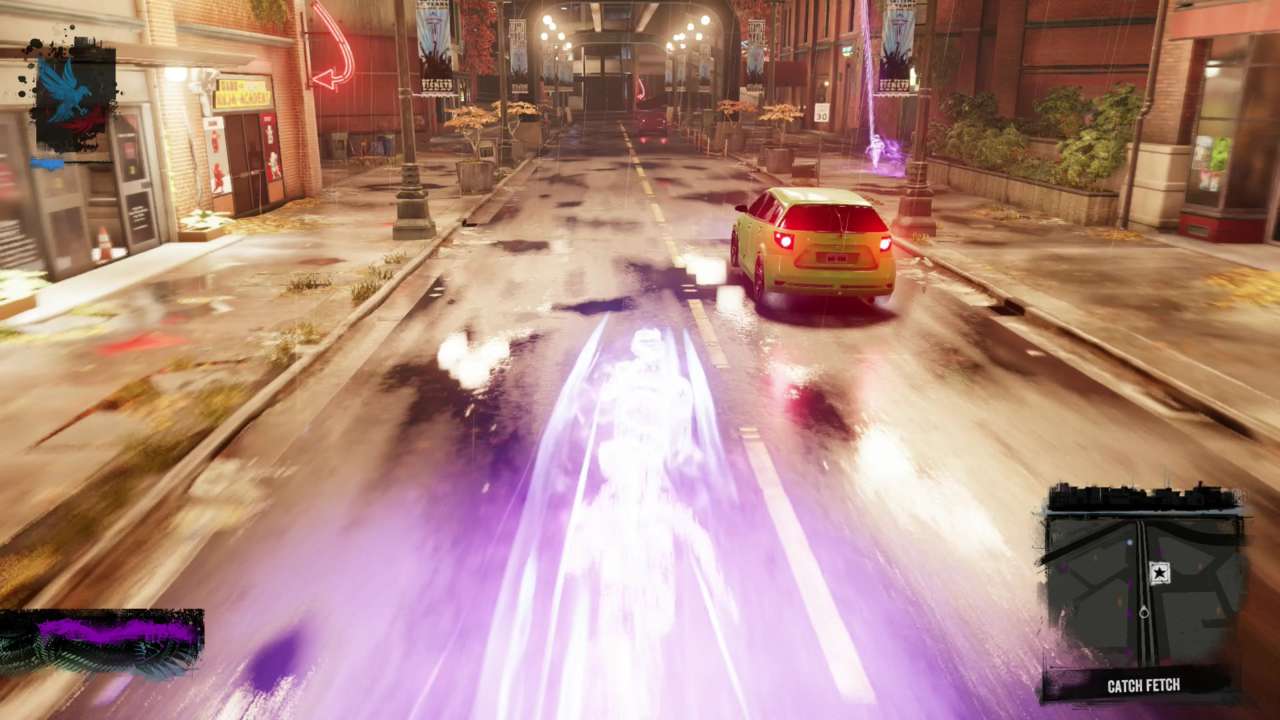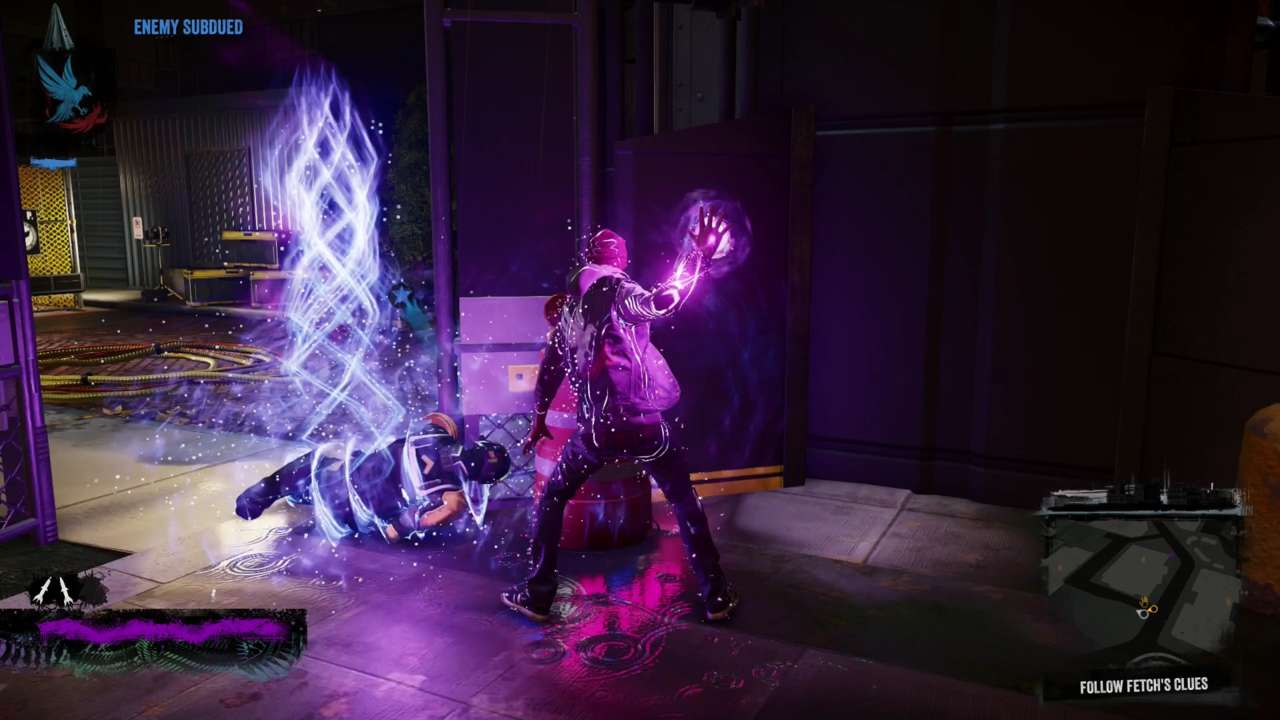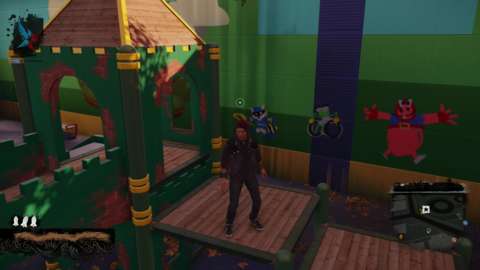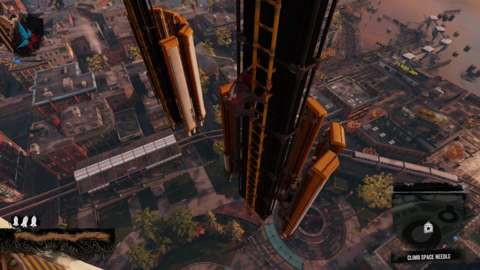Seattle is a police state. Department of Unified Protection director Brooke Augustine has set her fascist government organization loose on the God-fearing populace, abusing her power to round up those with mutant abilities. Unmanned drones patrol the skies, invasive checkpoints detain suspected bio-terrorists, and high-tech surveillance cameras monitor everyone's actions. It's a city built upon fear. The citizens willingly accept their new overlords because so many are scared of their friends and neighbors who are now imbued with superpowers. So when protagonist Delsin Rowe finds that he is able to absorb others' powers, he enters a society ready to pour their hatred upon him. Do you fight those who loathe you? Or free Seattle from the chains of an oppressive dictatorship?
The world of Infamous: Second Son plays upon the recent changes that have taken place within our own society. By offering an exaggerated viewpoint of the safety-over-freedom measures that are now a part of our daily lives, we see how dangerous such a path could be, and how few people rise up if their lives remain comfortable. It's an intriguing setup, but one that fails to stir a strong emotional response. The binary morality doesn't show a balanced angle that could have made you sympathize with the government's actions, even if you disagree with how those rules are enacted, and that one-sided viewpoint turns what should be a hard-hitting situation into one that's difficult to relate to.
You see the situation through the eyes of Delsin. His youth was spent spray painting cartoonish doodles while avoiding the wrath of his older brother, Reggie, a police officer with a firm belief in what's right and what's illegal. Delsin's immaturity is immediately an annoyance as he spouts terrible one-liners while shirking any responsibility. During the first hour of Second Son, you're stuck watching cutscene after cutscene establish the fiction, and that uneven pacing feels like shackles preventing you from exploring this gorgeous world. However, once you're set loose in Seattle, the narrative problems that haunted the early moments fade into the background as you flex your elemental muscles.
Once you're set loose in Seattle, the narrative problems that haunted the early moments fade into the background.
Delsin has a run-in with the escaped conduit Hank, who has smoke coursing through his veins. That chance meeting transforms Delsin from just another forgotten screw-up into the potential savior of a beautiful metropolis. Through the power of smoke, you can turn into a translucent wisp at a moment's notice. Float through air vents to propel yourself from the rain-drenched streets to the striking rooftops or drift like an ethereal shadow among the citizens compelled to fear you. The empowering sense of freedom worms its way into your heart once you realize your unbelievable potential. The slow-paced, methodical movement that defined the two earlier Infamous games has been stripped away here, replaced by a frenetic speed that has you rushing through this open world like a sentient lightning bolt.
Fights are structured for you to take advantage of your extraordinary abilities. Snipers perch upon billboards, armored vans carry reinforcements, and helicopters patrol the skies. Troops have the power of cement to complement their standard arsenal. They construct concrete walls and dive upon you with deadly might, so standing still is an easy way for you to meet a quick end. So you show off your quick feet, drifting into and out of fights, peppering aggressors with flaming missiles while you dance just out of their deadly strikes. Take too much damage, and your view becomes oversaturated while an angelic voice scores the soundtrack of your death. Unlike in previous Infamous games, your health regenerates over time, so knowing when to seek shelter and when to stay aggressive forces you to fight thoughtfully.

Second Son has a binary morality system that mirrors the black-and-white decision making from the previous games. If you're a callous jerk, for instance, you can choose to forsake your Native American heritage to avoid punitive measures from Augustine. If you'd rather sleep with a sound conscience, take responsibility for your actions so your tribe doesn't suffer. Without a moral gray area, these choices filter reality through a cartoonish prism where only pure good and unadulterated evil exist. Though these extreme decisions feel totally disconnected from reality, the manner in which this dichotomy exists within the framework of combat adds serious weight to your every action.
The empowering sense of freedom worms its way into your heart once you realize your unbelievable potential.
Delsin earns a single-use, screen-clearing attack no matter which side of the morality coin you fall on. When you play as a hero, you must tread with a light touch. You need to subdue enemies with smoke handcuffs instead of killing them off, and make sure you direct your attacks away from ordinary citizens. If you fail to follow these basic rules, your chain breaks, and your chance to use your most powerful attack disappears. On the villainous side, chaos is the key to earning that most treasured of prizes. Not only must you kill every attacker, but you must do so as quickly as possible. If you spend too much time between conquests, your multiplier vanishes, so you must act as aggressively as possible, indiscriminately exterminating anyone who moves.
Such opposing play styles better communicated who my Delsin was than the many tired cutscenes that encompass the rest of the narrative. During my first playthrough, I was as good as possible, so I fought with a methodical, thoughtful air that made me consider each flaming missile that I lobbed. I used restraint. When my health diminished, I hid in the shadows so as not to succumb to the angry forces. After a hectic victory, I would look upon the battlefield with wry satisfaction. My enemies lay prone before me, chained to the ground, left to think about the path they had chosen. I was both victorious and righteous. The citizenry recognized my efforts, and celebrated me when I walked the streets. I was a hero in action and word, and their fears of the unknown slowly dissipated.

It was during my second time through that I took the evil route and realized the extent of my extraordinary powers. No longer did I hold back. When an armored van would arrive, I would immediately toss missiles toward it, unconcerned about the collateral damage that would result. Overwhelmed enemies would surrender, desperate for respite, and as they walked toward me with arms raised above their heads, I would maniacally laugh as I lit their heads on fire. When bullets pierced me from every direction, I would grow angry, becoming even more reckless as I desperately tried to fill my kill quota. No one was safe when my Delsin was around. And the citizens who were taught to fear me yelled hateful remarks as I walked through the streets. The dumb ones, at least. I killed my share of loose-lipped normals.
Combat strikes a happy balance between the slow-paced affairs of the first Infamous and the overly chaotic endeavors of Infamous 2. Second Son offers speed with a purpose. So fine-tuned are your actions that you move with blinding speed and yet are always aware of your surroundings. Ensuring the action stays hectic without becoming overbearing is an extraordinary accomplishment, so much so that I happily played through twice only to still remain hungry for more. As I sprinted up the sides of buildings and called in explosive strikes, Second Son felt less like another Infamous and more like a new entry in the Prototype franchise. It's so fast, so frenetic, and so gloriously over the top that it makes the old days of Cole McGrath slowly climbing buildings seem like a distant memory.
The citizens who were taught to fear me yelled hateful remarks as I walked through the streets.
Delsin gains access to more powers beyond the smoke you start off with, and each transforms both the action and locomotion in interesting ways. You might employ a slow-motion effect to corral your enemies in a precise manner, or mix stealth into your explosive encounters to keep enemies guessing, and such twists ensure that each showdown keeps you thinking up new tactics as you revel in the destructive glory. Sadly, the powers don't branch in interesting ways depending on your moral choices, so though combat plays out in different ways, the weapons you use are nearly identical.

Missions present scenarios that urge you to fight in inventive ways. The myriad ways in which you flex your combat prowess left me glued to the screen as I eagerly overcame every roadblock in my way. Bosses mirror the brilliance of the normal forays by compelling you to move with speed and precision as you mount a hellacious counterattack. Fights stretch on longer than I expected, but instead of being tedious wars of attrition, they instead kept me riveted as I tried to perfect my craft. Standing up to my overpowered foes for these long battles felt like a victory well earned, and I was happy with the assortment of bosses on offer through the course of this adventure.
Second Son has top-notch combat that expertly melds substance with style. But despite the speed that separates this from previous games in the franchise, there's a feeling of familiarity that's impossible to shake. The Seattle in Second Son offers a stark contrast to the direction recent open-world games have taken. This is not a living, breathing world that you inhabit. Rather, it's a playground for you to go nuts in. The people who populate the world exist only for your benefit, so it never feels like a real city. It's an anachronistic return to what sandbox games used to be, and represents an approach that I still enjoy more than the serious options that populate store shelves. Still, I couldn't help yearning for more concrete improvements to what I've already experienced. The cutting-edge visuals are laid over a decade-old formula that is still fun though sadly showing its age.
That certainly didn't prevent me from getting 100 percent on both a good and an evil playthrough. Side missions nicely complement your story efforts so you have plenty of reason to roam if you want to spend more time in pristine Seattle. Second Son is not the tedious collect-a-thon that many open-world games are. Extra activities are clearly labeled on the map, so instead of wandering aimlessly around the rainy streets, you focus on maximizing your enjoyment. My favorite detour was spray painting inspiring messages on walls. Sure, the act of tilting the motion-enabled controller at the stencils was hardly thrilling, but seeing what artistic propaganda Delsin cooked up was always a treat.

Creating graffiti isn't the only way an unusual control scheme is used. During context-sensitive situations, you must manipulate the touchpad, and though this sounds incredibly gimmicky, it actually added to my immersion. Swiping to open a door to free those suspected of being conduits engaged me more than pushing a button could, as did holding my thumbs firmly on the pad as Delsin grabbed a generator he was trying to destroy. Employing controls different from the norm is always a tricky endeavor, and Sucker Punch did a great job of ensuring these little moments added to the experience rather than distracting from your actions.
Second Son focuses on pure enjoyment. It communicates that through the excellent combat that forces you to concoct crazy tactics to overthrow the invading forces. It draws you in further through its incredible visuals that not only hint at the PlayStation 4's impressive power, but employ a sensible artistic touch that makes Seattle a place you want to explore. It uses a complementary score to underline dramatic moments, and the sound effects pop with flair. And yet, for all of the elements in which Second Son excels, the narrative fails to carry its share of the weight. Still, don't become mired in the negativity as Delsin so often does. Instead, just laugh at the cheesy dialogue and chortle at how extreme the morality system is. Second Son is a great game that knows exactly what it is, and sucks you in with its unfiltered fun.